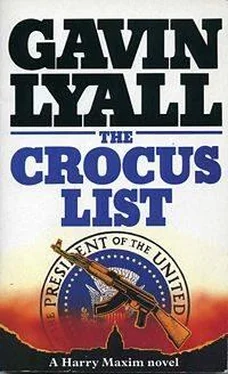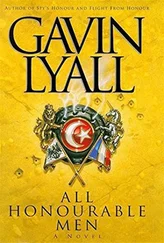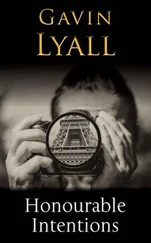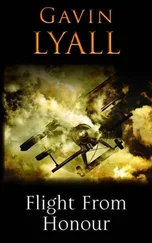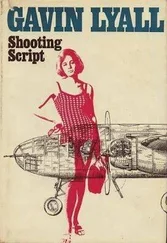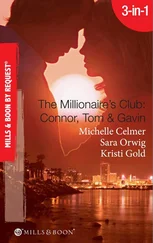"When we have the facts," the Colonel suggested. "I imagine this is something the police and Security are bearing in mind. The identity of the would-be assassin, once established, might help."
The DDCR took the reproof gratefully. "Fine. Leave it to George and his creepy-crawlie friends. Are we happy otherwise?"
The Colonel lifted Maxim's statement and put it down again. "I think this shows that Major Maxim acted quite reasonably, but… Where can you be contacted, Major?"
"I've got a billet at Wellington Barracks tonight, sir."
The DDCR said: "I don't much like you going back there-except you'll have to change out of that kit, of course. Your name's not supposed to be released, but the mess'll be full of gossip and speculation…"
George said: "I can put him up at Albany. Bags of room."
The DDCR frowned. In one way it was an ideal solution, but: "I don't want you two sitting up all night rehashing this and clouding Harry's mind withtheories."
"Fear naught. We'll talk nothing but women and shop, no politics. If we get cracking now, we even have time for a bite before the fuzz want Harry back again."
"What for?"
"Whatever happened to the fiend at the Abbey, he's now a faceless one. Harry could be the only man to identify his face, once they've got their photo files sifted."
The Colonel nodded. He had anticipated that, too. He stood up, sweeping papers into his briefcase. "May I ask -do you have a lawyer, Major?"
Maxim hadn't seen a solicitor since the last dreary paperwork after Jenny's death. "I suppose so…"
"A lawyer?" the DDCR demanded. "What's he want alawyer for?"
The Colonel and George glanced at each other, and Maxim felt he was missing something.
"Nothing, I hope," the Colonel said blandly. "But, just in case…"
Annette Harbinger knew Maxim had seen her moment of apprehension on recognising him, so she smiled ruefully and put her head on one side in a gesture he always found enchanting. "I'm so sorry, Harry-it's just that you always seem to pop up when there's bad news. I know you had nothing to do with today's…" and then she saw from George's expression that that was wrong, too. "Oh, dear…"
"It's not his fault, it's hisjob," George said. "We're putting him up for the night, slightly incognito. There's nobody else coming, is there?" George prided himself on never knowing what was happening in his private life: that way, it couldn't distract him or make him leave work early in order to be in time for it.
"Just the Defence Staff and their wives. No, darling, there's nobody coming. Is this going to be men only, gossipy women confined to the kitchen?"
"No, if we knew any secrets we'd be a lot better off…" George threw his topcoat on to a chair and reached for the decanter.
They talked families and schools-or rather, Annette and Maxim did-around one end of the vast table in the gloomy dark-panelled dining-room. For eighty years the eldest Harbinger sons had lived in Albany while waiting to inherit the family acres in Gloucestershire. There were not quite as many acres as George's colleagues alleged-as he pointed out, no one above the rank of Assistant Secretary thinks in less than tens of thousands of anything-but quite enough to spawn such envious exaggerations. Theenvy was, perhaps, less for the acreage than the independence it gave George; it infuriated people to think that a man so outspoken could never come to a Bad End or the Ministry of Agriculture. That he already had a set of rooms in that private backwater just ten minutes' stroll from Whitehall only made it worse. Their consolation might have been the thought of George living with great-grandmother Harbinger's choice of baronial panelling and immoveable mahogany furniture-if they had believed George had any more visual taste than a goat.
"Have you heard from Agnes recently?" Annette asked Maxim as she poured his coffee.
"Not for a while. She seems to be liking Washington, but she can't say much about her work there…" Agnes Algar had also been part of the old Prime Minister's inner circle at Number 10, as liaison officer with the Security Service. Now she was doing much the same job in the Washington embassy, liaising with, presumably, the FBI and CIA. "And I've been on courses I couldn't say much about, the letters just sort of…"
"You ought to have married that girl, Harry," George announced. "Somebody should, anyway. Woman reaches her mid-thirties without a husband, she turns sour, starts wearing clothes too old for her. Can't be much good in a liaison job: you need tact and awareness for that."
Tact? Awareness? Annette kept a smile on her clenched teeth and dreamt briefly of George with a coffee cup rammed down his throat. Maxim put on his polite smile. He had seen nothing in Annette's own tactfulness-nothing more, that is, than the usual wish of every married woman he knew to get him remarried as soon as possible.
George looked at his watch and stood up. "I want to catch the nine o'clock news on TV. They won't have anything new, but they'll be running everything they've got from the Abbey."
"Can we record it?" Maxim asked.
"Youmight be able to; it takes me half an hour to set up that blasted thing and then it usually gets the wrong programme. They ought to give away a ten-year-old child with every video machine. And every other sort of machine they're swamping us with these days."
Maximfiddled the video recorder into life while they watched. Since the BBC hadn't been allowed into the Cloisters for any later footage, they were reduced to running the moment of the shots three times. But the Queen had just reached the Abbey doorway when the first shot sounded, so by then the director had switched to his outside cameras and commentator. It had taken three seconds or more to realise the shots were inside, and to switch back there, and longer before a camera steadied on the scurrying, crouching mob that had been the congregation. By then, the shooting had stopped.
"Poor sods," George said. "There you have the flower -faded, mayhap, but the flower nonetheless-of the free world's Royalty, statesmen and men at arms. Between them they must have ordered more shots fired than the world's had hot dinners, and now somebody's blasted off near them. Poor wee cow'rin', tim'rous buggers." But he sounded genuinely sympathetic.
They watched armed police struggling through the crowd, then the camera spotted and zoomed in on the huddle and overturned chairs where Paul Barling had collapsed. It was difficult to see, from thst angle, how close the shots had come to the President's party. And, fixed high on either side of the Nave, no camera could peer round to the firing point above the South Transept. They kept the recording going, however, just to hear the distant snap of Maxim's own shot and then the thud of the grenade.
"Just under four seconds," Maxim said, looking up from his wristwatch.
"Four-and-a-half-second fuse in the grenade," George guessed knowledgeably. "Does that tell you what type it-"
But the BBC already knew: an obsolete Russian type, so the fragments proved. Moreover, the only item found on the body had been a London street guide with two telephone numbers scrawled in it. They had proved to be the unlisted private numbers of two Second Secretaries at the Russian embassy.
"Good Lord," George said.
Fresh from Miss Tuckey's lectures at the Fort, Maximcringed at the incompetence of it. The news item ended with a reporter mouthing earnest platitudes against a background of Scotland Yard's revolving sign. George switched off.
"It didn't tell us why the weapon jammed," Maxim said.
"Do they jam easily?"
"Not those AKs, no."
"Well, thank God it did." The phone rang in another room and they said nothing until Annette came and called Maxim out. He returned already putting on his car-coat. "You were right. The Yard wants me to go and view their pin-up boys."
Читать дальше
